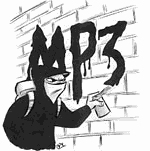“I feel like a character in an early part of a John Grisham novel,” quips David Osgood. The long-limbed lawyer is folded up behind his desk in a cramped 14th-floor, one-room office decorated with case files, diplomas, and a few tacked-up comic strips.
In the two years since he graduated from the University of Washington’s law school, Osgood hasn’t uncovered a thrilling conspiracy. But his legal legwork has led to high-profile tangles on behalf of hip-hop clubs with the Seattle Police Department, City Attorney Mark Sidran, and the Washington State Liquor Control Board.
When asked if there’s a chance in hell of a solo crusader beating the collective might of city hall, the cops, and the state, Osgood grins and says, “I’m winning.” Not only does the 32-year-old Osgood rankle the authorities with his defiant attitude, but he actually believes he’s on the verge of eradicating some of their long-established policies.
Raised in the small farming community of Ferndale, about 10 miles north of Bellingham, Osgood didn’t dream of attending law school. His grandfather wanted him to work at the local pulp mill, but the teenager instead enrolled at nearby Western Washington University. Two years later, he transferred to the UW. As a senior, Osgood toyed with the idea of becoming a lawyer. “I looked at all of my classmates who were studying for the LSATs, and I went, ‘Y’know, I don’t like you guys very much, and you’re all going to law school,'” he recalls.
Working as a paralegal re-inspired him, however, and he returned to the UW, where he became a founding member of the law school’s ACLU chapter before graduating in 1996. After sending out more than a hundred r鳵m鳠with scant response, Osgood became frustrated and opted to go solo. Soon after, he met Chris Clifford.
A self-described “smart-ass” who owns Jersey’s All American Sports Bar, Clifford had been battling the Liquor Board and Seattle police since 1992 when two officers visited him to inquire about the club’s popular weekend hip-hop events. Told by the Liquor Board that his liquor license could be jeopardized if he continued to host the DJ nights, which he says typically attracted between 300-500 mostly black patrons, Clifford pulled the plug in 1992. (He’s since reinstated live music, with acid-jazz bands, in a lounge area of Jersey’s called the 700 Club.)
In 1996, the fresh-from-law-school Osgood began working on Clifford’s civil suit, which seeks $950,000 plus punitive damages from the city and individual officials such as Liquor Board agents, police officers, and then-Mayor Norm Rice.
Osgood sprang to the defense of other embattled restaurants-turned-nightclubs including Oscar’s II, a Central District soul-food joint.
City Attorney Sidran used the infamous drug-abatement law to try to shut Oscar’s doors. Designed to combat crack houses and meth labs by holding property owners responsible for criminal behavior, the 1988 statute gave authorities the power to conduct on-site undercover investigations and even to temporarily close a structure. The Oscar’s case wasn’t the first attempt to shut down a legitimate business, but the police’s use of drug addicts as informants, and other controversial tactics, sparked an outcry from the African-American community and the media.
Two weeks ago, Sidran’s office dropped the case.
“You only do that for one reason,” Osgood says. “You are afraid you are going to lose.”
Soon the emboldened attorney will butt heads with the state Liquor Board in federal court over Clifford’s Jersey’s All American Sports Bar. Osgood argues the Liquor Board has overstepped its authority with its regulation of “added activities”—i.e., by dictating whether a club that serves booze can also have live entertainment. Osgood hopes to overturn the “added activities” policy on the grounds that it amounts to a prior restraint, and is therefore unconstitutional.
Last week, the Liquor Board announced that it’s considering a change that would “simplify” the “added activities” rules Osgood is assailing: Bars would automatically get permission to host live music if local authorities approved.
A spokesperson for the Liquor Board denies that Osgood’s legal actions prompted the move, but that doesn’t stop Osgood from taking credit.
Osgood says that working on the various cases fueled his desire to instigate changes in the city’s and the Liquor Board’s policies. “There’s a lot of abuse of authority in these cases, and you can’t ignore the patterns,” he explains, then adds that he didn’t seek out this line of work. “Frankly, it’s a niche that developed for me.”
Local officials probably would have preferred it if Osgood had never found his niche. Representatives at the Liquor Board and in the city attorney’s office accuse Osgood of misinterpreting their actions. “I think he’s painting some really broad strokes,” says Liquor Board spokesperson Gigi Zenk. In addition, they downplay his role in changing their actions.
But last week a new political initiative was filed calling for the termination of the entire Liquor Board. Meanwhile, public outcry against the drug-abatement and added-activities laws continues to grow. Osgood’s work seems to have had a tangible effect.
And he shows no signs of giving up. “It’s a good fight,” he says. “I feel privileged to be doing it.”






